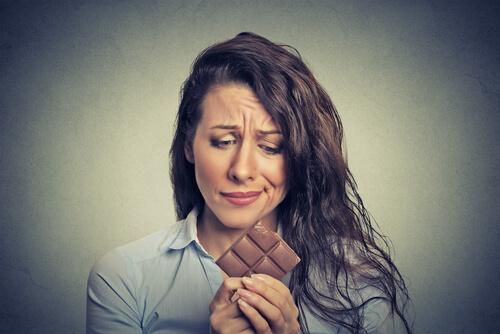Why Do We Eat When We Aren't Hungry?

Undoubtedly, you have experienced a moment in which you devour the first thing you can get your hands on. This may happen at home, or even in the street when you talk past a store. You see something you want to eat, and the temptation to buy that cookie, that bag of chips, or that ice cream, just completely overtakes you.
But, when you do this, are you really hungry?
In order to explain this sensation, we must start with a standard definition of hunger:
“Hunger is the sensation that indicates natural need to provide the body with sustenance. It is produced by substances that operate in the brain, in the hypothalamus.”
When considering those past moments in which you were overtaken by the desire for food, you may not have actually been hungry. You may have even eaten a meal recently, but still felt the need to eat more.
In those moments you may not have necessarily notice the physical state of your stomach or digestion, or in more serious circumstances the possibility of low blood sugar that can cause fatigue and dizziness.

What is important in these situations is to realize the difference between the urge to eat because we are hungry, and the urge to eat even though we don’t actually physically feel hunger. That distinction will mark the difference and recognizing it will help us to control our cravings.
With this in mind, try to keep track of how many times you eat without having a real appetite. Why do you do this? These decisions and actions can be heavily influenced by our moods, emotions, and different situations we find ourselves in throughout the day.
Situations that drive us to eat when we aren’t hungry:
1. Stress from work or taking exams
These stressful situations can be manifested physically by behaviors such as excessive smoking, eating, or drinking.
Furthermore, in these moments, our judgement can be compromised and, to a certain extent, we can lose control. In these situations, it is common to unconsciously turn to unhealthy foods (fatty, salty junk foods, and sweets).
When we are stressed, we may also be eating at inopportune moments, snacking excessively, or eating a lot late at night. When we do this, it is easy to lose track of how much we eat. It is important to always try to keep track of portions and quantity.
This excessive snacking on unhealthy foods can generate even more stress and anxiety. It can even cause us to feel regret and/or frustration, about our actions or about what we have eaten.
2. Worry when confronted with change
It is very common to hear that people cannot sleep due to being worried about something. And when they cannot sleep, they may get up to eat or drink something in the middle of the night.
Sometimes, we eat because we are trying to “quiet” our nerves, as if they were like the growling of our stomach.
It is necessary to identify the situation we are experiencing that is causing us stress or that is out of the ordinary from our usual routine. We have to do this to be able to know why we have this appetite for eating.
Worrying about how things will turn out, or whether or not we will be able to achieve something, within the context of change in our lives can create a great amount of stress. It can cause us to lose sleep, or not sleep well, or be completely preoccupied thinking about the potential consequences of change. This build-up of stress can greatly influence us when it comes to what and how we eat.

3. When advertisements influence our hunger
The world of marketing knows very well how to bring out certain emotions or urges, and takes complete advantage of these human weaknesses in order to sell more product. They make us hum their tunes, know their trademarks, and recognize their branding.
Keeping this in mind, upon seeing or hearing an ad of a certain food or drink product, we can see that we are tempted to consume that product, regardless of time of day or present situation. How many times have you seen an ad for a drink and immediately feel the urge to go get one?
What can we do to control our urges?
Count how many hours you go without eating. If it is less than three hours, try not to eat anything else. If it has been less than three hours since the last time you ate, it is likely that you aren’t feeling real hunger quite yet.
Take a step back, take a deep breath, and identify your emotional state. Are you nervous? Have you been stressed out all day? If you find the answer is yes, you probably are not actually hungry, but rather feel the need to somehow distract or relieve yourself from this emotional agitation.
The next time you are watching television and you see some kind of food or drink, either in a show, movie or commercial, and your immediate reaction is to reach for a snack or a glass of that drink, try reaching for a glass of water first. Try it, and see if it helps you to resist that extra drink or snack.
In general, regardless of the reason for eating without really being hungry, the most important thing to do is recognize it and accept it in order to be able to identify the cause of this impulse. Only this way can the real source of stress be confronted and resolved.
This text is provided for informational purposes only and does not replace consultation with a professional. If in doubt, consult your specialist.








